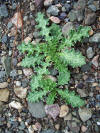WILD
FOODIES' HOME PAGE
PLANT PROFILE LIST
NAME: Milk Thistle
SPECIES / FAMILY: Silybum Marianum / Asteraceae or Compositae
OTHER COMMON NAME(S): Saint Mary's thistle, Mediterranean milk thistle
CONDITIONS: full
sun, sandy and rocky soil
|
PARTS: |
EDIBLE |
TASTE |
RAW/COOK |
SEASON |
|
All |
|
|
|
|
|
Shoots |
|
|
|
|
|
Leaves |
|
Mild/young |
RAW/COOK |
Spring |
|
Stalk/Stem |
|
slightly bitter |
PEEL/RAW/COOK |
Spring |
|
Buds |
|
MILD |
COOK |
Spring |
|
Flowers |
|
|
|
|
|
Fruits |
|
|
|
|
|
Pods |
|
|||
|
Seeds |
|
coffee sub |
ROAST |
|
|
Nuts |
|
|
|
|
|
Roots |
|
mild/salsify |
RAW/COOK |
Fall |
|
Bark |
|
|
|
|
PORTION: small-medium
COMMENT: Root somewhat mucilaginous texture. Leaves very sharp leaf-spines must be removed first, which is time-consuming. When cooked they make an acceptable spinach substitute. Flower buds a globe artichoke substitute. Stems can be soaked to reduce the bitterness. Palatable and nutritious, they can be used like asparagus or rhubarb or added to salads. The roasted seed is a coffee substitute. A good quality oil is obtained from the seeds. (1)
CAUTION: Use gloves to avoid spikes. Soak roots for 24 hours & change water once before cooking in order to avoid flatulence. Also see: https://www.pfaf.org/user/Plant.aspx?LatinName=Silybum+marianum
NUTRITION/MEDICINAL: Astringent; Bitter; Cholagogue; Diaphoretic; Diuretic; Emetic; Emmenagogue; Hepatic; Homeopathy; Stimulant; Stomachic; Tonic. (1)
o https://www.webmd.com/vitamins/ai/ingredientmono-138/milk-thistle
o https://draxe.com/milk-thistle-benefits
LOOK-A-LIKES: other thistles, such as Bull and Field thistles
POISONOUS LOOK-A-LIKES:
OTHER USES: Green manure; Oil from seed (1)
SOURCE LINKS (may include nutritional and medicinal info, plus other uses):
- https://pfaf.org/user/Plant.aspx?LatinName=Silybum+marianum
- http://www.eattheweeds.com/thistle-touch-me-not-but-add-butter-2/https://en.wikipedia.org/wiki/Silybum_marianum
- http://www.foragingtexas.com/2006/05/thistle-milk.html (good photos)
- http://www.ediblewildfood.com/milk-thistle.aspx (good photos)




